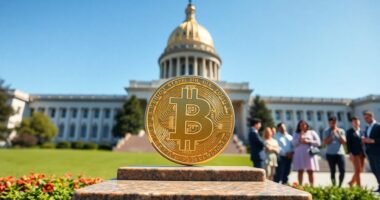You might be surprised to learn that Robert Kiyosaki views Bitcoin as a safer investment than the US dollar. He believes Bitcoin's limited supply makes it a strong hedge against inflation, unlike the dollar, which he sees as increasingly vulnerable. As economic instability looms, Kiyosaki's strategy of shifting towards Bitcoin raises intriguing questions about the future of currency and wealth protection. What could this mean for your financial decisions?

While many people consider the US dollar a safe bet, Bitcoin is emerging as a surprisingly resilient alternative in today's unpredictable economic landscape. You might wonder how Robert Kiyosaki, a well-known financial educator, sees Bitcoin as a superior choice. His perspective revolves around several economic principles that highlight Bitcoin's potential benefits over the dollar.
First off, let's talk about volatility. Bitcoin's price can swing dramatically, which can make it risky for daily transactions. However, this volatility also presents an opportunity for significant returns. Kiyosaki argues that while the US dollar is generally stable, it's still vulnerable to inflation and economic policies that can devalue it. In contrast, Bitcoin's limited supply positions it as a hedge against inflation, which is something the dollar simply can't offer. This is where Kiyosaki's application of Gresham's Law becomes relevant; he believes that "bad money" (like the dollar, due to its inflationary potential) drives out "good money" (like Bitcoin). Additionally, investing through a Bitcoin IRA can provide tax-efficient growth for retirement savings.
Moreover, Metcalfe's Law supports Kiyosaki's view. As more people adopt Bitcoin, its value increases, enhancing its potential as an investment. Unlike the dollar which is centrally controlled and can be printed at will, Bitcoin operates on a decentralized network, providing an interesting alternative. This decentralization might lead to unpredictable price movements, but it's also seen as a strength, allowing it to operate independently from government influences. Recent studies have shown that Bitcoin's status as a safe-haven asset is region-dependent during crises, which adds complexity to its evaluation.
Kiyosaki points out that Bitcoin has shown promise as a safe-haven asset during specific crises, like the Russia-Ukraine conflict. While gold has historically served this role, its status waned during the COVID-19 pandemic. The US dollar, once a robust safe-haven currency, is witnessing a decline in that role due to ongoing geopolitical tensions and economic policies.
When considering investments, you face a classic dilemma. Bitcoin promises high returns but comes with considerable risks due to its volatility and the potential for cyber threats. On the flip side, the dollar may be a low-risk investment, but it offers lower returns. If you're interested in privacy, Bitcoin transactions are pseudonymous, providing a layer of confidentiality that traditional currency lacks.









